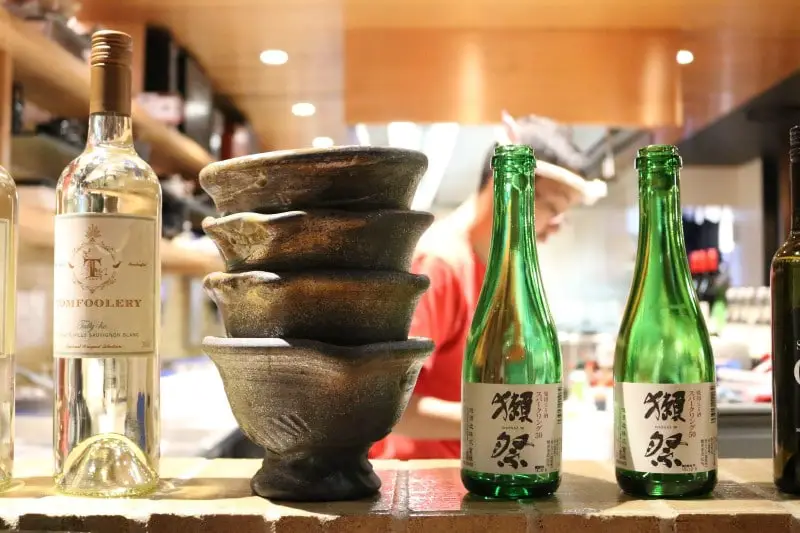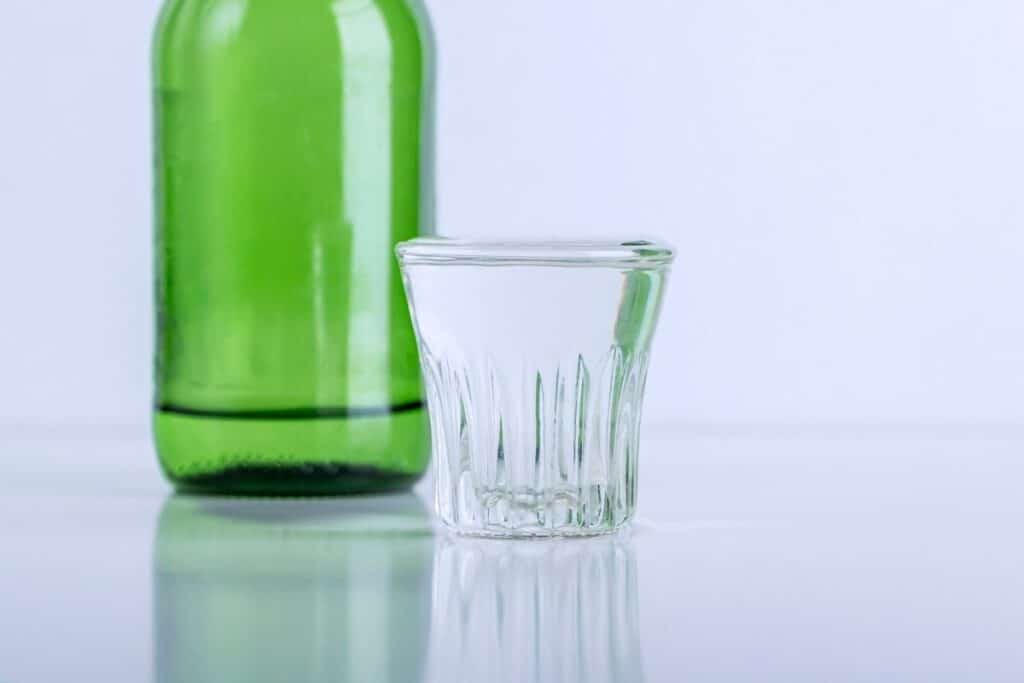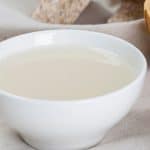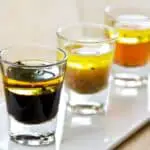Key points:
- Alcoholic alternatives include sake, Chinese cooking wine (Shaoxing), dry sherry, vermouth, marsala wine, white wine, and Aji-mirin (a non-alcoholic mirin substitute).
- Non-alcoholic options include rice wine vinegar, balsamic vinegar, white grape juice (add lemon juice for acidity), and apple cider vinegar (with a pinch of sugar).
- When using alcoholic substitutes, remember to cook off the alcohol to avoid overpowering the dish, and you may need to adjust sweetness levels with sugar.
Mirin is generally used in dishes with Asian flavor profiles. If you’re preparing miso soup, soba noodles, ramen, sukiyaki, or Chinese stir fry, there is a good chance that it will be required in your recipe. If your local grocery store doesn’t stock mirin, or you need a non-alcoholic substitute for mirin wine, this guide is just for you.
If you’re not familiar with the taste of mirin, we’ll give you a quick rundown of the flavor profiles you’re looking to replace and then help you choose the closest match for your dish.
What is Mirin?
This Japanese rice wine is a staple in Japanese cooking. The difference between mirin and sake is that mirin has a lower alcohol content and is somewhat sweeter. The sweetness comes from natural sugars that form during the fermentation process with no additional sugars added thereafter.
You will find three common types of mirin that differ mainly in their alcohol content. Hon mirin is manufactured in a 40 to 60 day period and contains around 14% alcohol. Shio mirin contains 1.5% alcohol, and shin mirin has less than 1% alcohol which makes it more of a seasoning.
The longer mirin ages the darker the color generally is. All three types taste similar, however can be used for different purposes in cooking. When the rice wine is heated during cooking the alcohol will mostly burn off. Mirin with a higher alcohol content can be used to tone down the strong aroma and flavor of fish as the alcohol cooks off and evaporates while enhancing other flavors.
The Japanese rice wine brings a delicious umami flavor to dishes with its richness, sweet notes, and sticky consistency. It is often combined with soy sauce to yield the perfect sweet-salty combination that pairs well with stir fry and makes a delicious glaze for pork, meat, and even tofu.
Mirin cooking wine can be used paired with a host of other ingredients or on its own with sushi, tempura, in ramen, fish, seafood, and mushroom dishes as well as broths.
One thing to be careful of when using mirin or other high-alcohol substitutes is that adding it to fish too early in the cooking process can affect the texture of the protein, causing seafood to firm up and become rubbery. To retain the delicate texture of fish, you either want to use the mirin marinade before cooking, add it in the later stages of cooking, or cook off some of the alcohol first.
When choosing the best mirin substitutes, consider whether you need to find a non-alcoholic alternative and what other flavor profiles you want to accentuate in the dish. Also consider the consistency of the replacement as this can play a significant role, especially in glazes and dipping sauces.

Best Alcoholic Mirin Alternatives
Sake
Also being Japanese rice wine, sake is a great mirin substitute, but it is important to note that it has a higher alcohol content and that it is less sweet. Adding white sugar to sake will make it sweeter and reduce the alcohol content.
Sake is useful in marinades as it helps remove odors and tenderizes the meat. To get the same umami flavor in your dish use 3 parts sake to 1 part sugar. If needed, add a little more sugar to taste. The amount of sweetness will depend on the dish you are making and your personal taste preference.
Cooking sake may have a slightly lower alcohol content compared to drinking sake. Cooking sake is not recommended for drinking since it doesn’t have a refined taste but is more geared to season and add umami notes to cooked recipes.
See more: Alternative to sake
ShaoXing Cooking Wine
Chinese rice wine, also known as Shaoxing cooking wine or Chinese cooking wine, is the Chinese version of sake. As with cooking sake, it is not intended for drinking since it has an unrefined salty alcoholic taste. It has a stronger flavor than sake and a darker color, close to that of soy sauce. Start by adding less Shaoxing cooking wine than required in the recipe and slowly add to taste only if necessary.
Lower-salt varieties are available, which can bring an ideal balance of tangy, sweet, and salty notes to your dish. Depending on the brand you are using, you may want to add a little sugar when using it as a replacement for mirin.
It is a suitable replacement to use instead of mirin in marinades and meat dishes, stir fry sauces, broth, and stews.
Dry Sherry
If you have dry sherry on the wine rack, grab it as a replacement. You can however also use cooking sherry. Unlike drinking sherry that you will find with other wines and liquors in the store, cooking sherry is sold in the aisle with vinegar and cooking ingredients.
Cooking sherry is not intended for drinking since it has additional seasoning with a saltier and harder flavor that is not as smooth on the palate as drinking wine. It is generally a lower quality product than regular drinking sherry and contains preservatives to prolong its shelf life. Due to its high level of salt, cooking sherry is best used in savory dishes.
Sherry, which is essentially a blend of wine and brandy, may lack the umami notes of mirin but still add a similar depth of flavor to enhance sauces, soups, meaty stews, and marinades. To replace one tablespoon of mirin use one tablespoon of dry sherry with half a tablespoon of sugar, or according to taste.
Related: What Are The Best Substitutes for Sherry?
Vermouth
Similar to sherry, vermouth is a fortified wine. Besides the addition of brandy, vermouth is also infused with aromatic herbs and spices whereas sherry has more of a natural wine flavor profile. Sweet vermouth is red, while dry vermouth is white. It is also available in alcoholic and non-alcoholic versions which makes it a versatile product to use for almost any type of dish.
Dry vermouth is generally less sweet than mirin so you may want to add sugar when using it as a replacement. This will however depend on your personal taste preference. The recommended amount of sugar is two tablespoons for every half a cup of vermouth as a substitute for half a cup of mirin. Use it for glazes, sauces, meat and chicken dishes, broth, or soup.
Marsala Wine
Marsala wine is a rich-tasting fortified wine ideal for sauces with nutty caramel notes. Dry marsala and sweet marsala wine can both be used as a replacement, although the sweet version will give you a closer flavor match.
If you only have dry marsala on hand, add just a little sugar to get the same level of sweetness. It can be used in almost any application that requires a substitute including meat and poultry marinades, sauteing vegetables, glazes, and stews.
Related: What can I use instead of marsala wine?
White Wine
The great thing about using wine as a good substitute for mirin is that you can choose the type of wine that best matches your dish flavor profile. For savory dishes, dry options like Sauvignon Blanc, Chardonnay, and Pinot Gris are best while sweet white wine with fruity notes can be used in desserts or dishes with a salty-sweet element.
Use white wine in equal quantities as a replacement and remember that it is best used in cooked dishes so that the alcohol can cook off.
Related: Alternative to white wine for cooking
Aji-Mirin
Since traditionally made, high-quality, authentic mirin can be pricey and harder to find, Aji-mirin is a type of copy-cat Japanese sweet rice wine that tastes very close to the real deal. It contains almost no alcohol and has a somewhat sweet flavor.
With its balanced taste, it enhances other flavors rather than overpowering them. This makes it suitable as a substitute in almost all recipes from stir fry and tempura to rice, steak, and even desserts. Use Aji-mirin in equal quantities as a replacement in your recipe.
Best Non-Alcoholic Mirin Replacement
Rice Wine Vinegar
Where wine is more suitable for cooked dishes, white wine vinegar, and rice vinegar are ideal for uncooked salad dressings and dipping sauces (although they can be used just as successfully in cooked recipes).
In the case of rice wine vinegar, the rice wine undergoes fermentation which causes the alcohol to turn into acetic acid. It is thus a non-alcoholic mirin substitute. Rice wine vinegar has a mild, sour tang, and slightly sweet taste.
To offset the sharp taste of vinegar when using it as a replacement add half a teaspoon of granulated sugar for every tablespoon of rice wine vinegar in your recipe. Stir together until the sugar is dissolved and then add it to the rest of the ingredients in sauces, marinades, or dressings.
Balsamic Vinegar
Balsamic vinegar is made from whole white grapes that are boiled down and then matured. It has a dark color, and a strong vinegar flavor with rich, fruity, and slightly sweet notes. This can be used as an alternative in dressings, dipping sauces, marinades, and broth. Use it in equal quantities, but add some sugar if you want the same sweetness level as mirin.
White Grape Juice
White grape juice is sweeter than most of the other substitutes we’ve mentioned and while it may not have the umami depth to match, it does bring a gorgeous fruitiness.
To counter the sweetness from this non-alcoholic fruit juice, add a splash of lemon juice (about one tablespoon per cup of grape juice). This should provide a similar balance to what you’re after. Use this in dressings, sweet-and-sour sauces, and marinades.
FAQ
Although mirin is an ingredient in teriyaki sauce together with soy, garlic, ginger, and sugar, the consistency and flavor are somewhat different. If your recipe requires both soy sauce and mirin, you can use teriyaki as a combined replacement for both ingredients.
Apple cider vinegar can be a suitable replacement in marinades, dressings, and even sushi rice. It has a strong acidic and slightly fruity flavor. You can use it in equal quantities and add ¼ teaspoon of sugar for every tablespoon of apple cider vinegar to create a closer matching balance.
Since mirin is a type of wine you may think that it won’t go bad, but in fact, it only keeps its best quality for up to two months. Although it can be used after that time, the flavor quality will start to decline.
Yes, you can use vinegar as a substitute for mirin in some recipes, but keep in mind that mirin adds a slightly sweet and milder flavor compared to vinegar. To mimic mirin’s sweetness, you can add a pinch of sugar or honey to the vinegar.
Conclusion
From sushi rice and dipping sauces to stir fry and broth, mirin is an umami-enhancing rice wine traditional to Japanese dishes. Important things to remember when cooking with mirin or alcoholic substitutes is that (1) the alcohol should be cooked off to prevent having a raw alcohol flavor in your food, and (2) many substitutes may require you to add a little sugar to achieve the same sweetness in your dish.
Substituting means you can tailor the sweetness and acidity levels in your dish to exactly how you like it. If you’re using white grape juice as a non-alcoholic alternative, just remember that this is one ingredient that is already very sweet so will need some acidity to balance it out in the opposite direction. Have fun creating salty, sweet, rich, and deeply delicious flavors as well as mirin sauce.
*image by V_Elena/depositphotos &chaliceks









